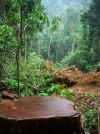 Two recent cases of social conflict between logging companies and local communities that have reportedly resulted in violent police interventions, arrests and reported abuses. According to independent reports, in April this year the Bosanga community in Yalisika village, Bumba (Equateur province), protested against Siforco's (DRC-based subsidiary of the Danzer group) operation in the area claiming that the company did not honour its promises to invest in social infrastructure. Siforco then called for police intervention, which resulted in violence: it was reported to Greenpeace that several villagers were badly beaten by police causing one person, Mr Momoma Tika Fr‚d‚ric, to die. Several women were reportedly raped and the property of many villagers was destroyed.
Two recent cases of social conflict between logging companies and local communities that have reportedly resulted in violent police interventions, arrests and reported abuses. According to independent reports, in April this year the Bosanga community in Yalisika village, Bumba (Equateur province), protested against Siforco's (DRC-based subsidiary of the Danzer group) operation in the area claiming that the company did not honour its promises to invest in social infrastructure. Siforco then called for police intervention, which resulted in violence: it was reported to Greenpeace that several villagers were badly beaten by police causing one person, Mr Momoma Tika Fr‚d‚ric, to die. Several women were reportedly raped and the property of many villagers was destroyed.
On May 15th, Greenpeace was reliably informed that people had been beaten and arrested by policemen in the Inongo area (Bandundu province), reportedly as a consequence of a conflict between the community and Sodefor (DRC-based subsidiary of Liechtenstein-registered Group NorS_§dTimber). Seven people are still in custody in what are reported to be appalling conditions, and without any clear legal charges being made against them.
"One of the main sources of these ever re-occurring conflicts is the absence of participative land use planning in forest areas allocated to logging - said Rene Ngongo, of Greenpeace Africa - It is crucial that the Democratic Republic of Congo government and the international donor community commit themselves to uphold the moratorium on the allocation of new logging operations."
Both Sodefor and Siforco claim to be moving towards Sustainable Forest Management, with the support of some key donors countries. For instance, in January Sodefor was issued a Controlled Wood FSC (Forest Stewardship Council) certificate for logging areas where social conflicts occured. On May 13, Greenpeace International launched a formal complaint to the FSC to dissociate itself from Sodefoand urged the FSC to put an immediate halt to the granting of new certificates for industrial-scale logging in the Congo Basin until preconditions for credible FSC certification are established. Recent violence shows us that sustainable forest management doesn't exist in Democratic Republic of Congo. Greenpeace, along with a number of other environmental groups, retains its support for the FSC, but says it is trying to reform the certification standard from within.
To avoid further controversial certificates being issued and to maintain the support of the FSC's members and stakeholders, FSC should not associate itself with companies such as Sodefor. These companies are not only involved in fragmenting large High Conservation Values Forests, but also in social conflicts linked to the violation of traditional and human rights.
More than 15 million hectares of rainforest are currently allocated to the logging industry. The expansion of logging into remaining areas of intact forests in the DRC will destroy globally critical carbon reserves and impact biodiversity. Beyond environmental impacts, logging in the region exacerbates poverty and leads to social conflicts.


